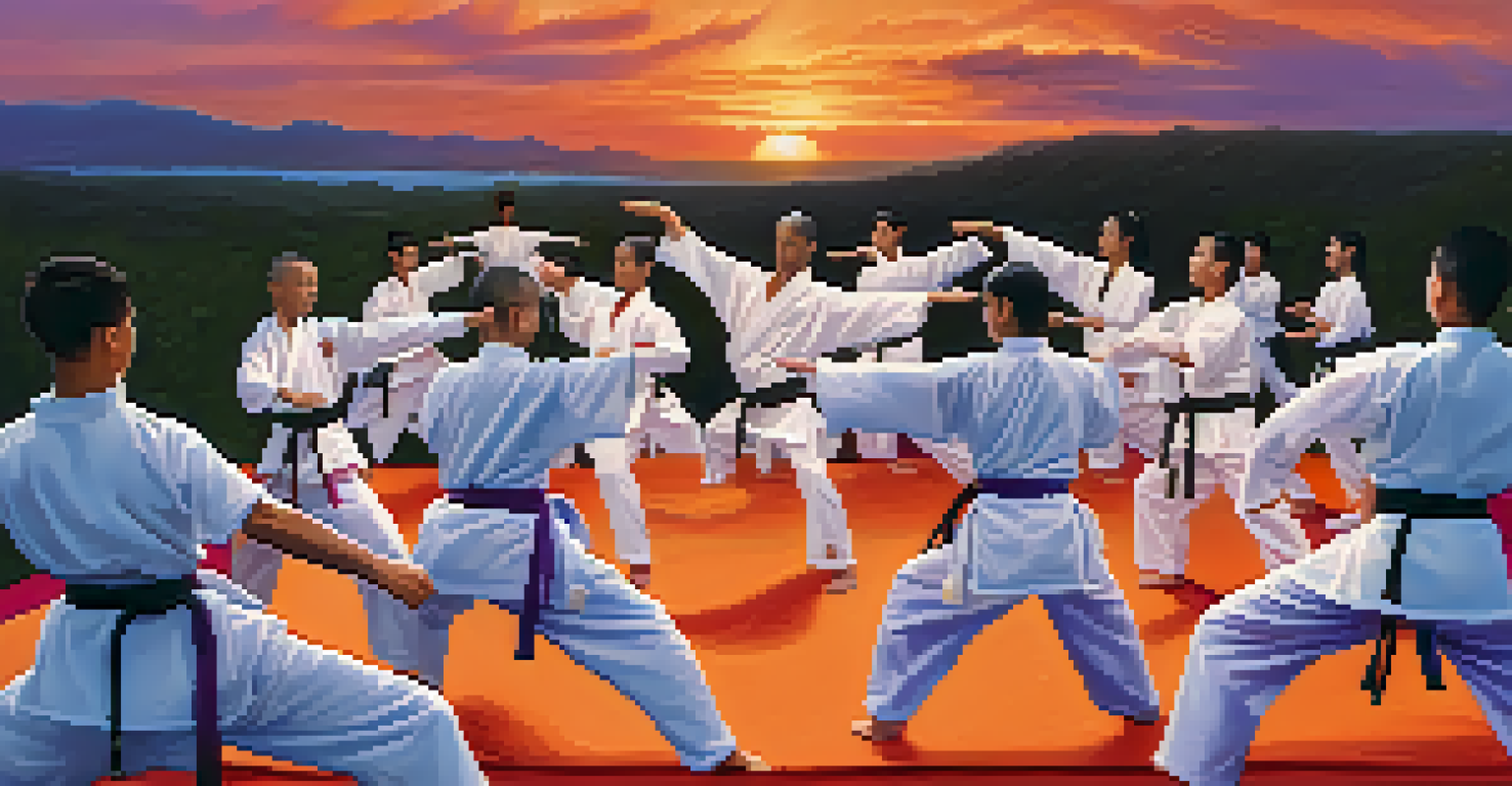Mindfulness in Martial Arts: Boosting Emotional Awareness

Understanding Mindfulness in Martial Arts Practice
Mindfulness is the practice of being present and fully engaged in the moment. In martial arts, this means focusing not just on physical movements, but also on mental awareness and emotional regulation. When practitioners embrace mindfulness, they can cultivate a deeper connection between their mind and body, leading to improved performance and well-being.
The mind is everything. What you think you become.
For instance, a martial artist might use deep breathing techniques before a sparring session to center themselves. This practice helps clear distractions and enhances their ability to respond to opponents with clarity. The act of being mindful transforms martial arts from a mere physical endeavor into a holistic experience.
Ultimately, mindfulness allows martial artists to recognize their emotional states—whether it's anxiety before a competition or frustration during training. By acknowledging these feelings, they can learn to manage them effectively, resulting in a more balanced approach to both martial arts and life.
The Connection Between Mindfulness and Emotional Awareness
Emotional awareness is the ability to recognize and understand one’s feelings. In martial arts, this awareness is crucial; it enables practitioners to respond rather than react to situations. By practicing mindfulness, martial artists can tune into their emotions and gain insights into how these feelings affect their performance and interactions.

For example, a student might notice that their anger during training leads to a more aggressive style, which could compromise technique. By being mindful, they can identify this emotional trigger and adjust their approach, fostering a more controlled and effective practice. This self-awareness cultivates a sense of empowerment over their emotions.
Mindfulness Enhances Performance
Practicing mindfulness improves focus, precision, and emotional regulation, leading to better outcomes in martial arts.
As martial artists develop emotional awareness through mindfulness, they can also enhance their empathetic abilities. Understanding their own emotions helps them relate better to their training partners and opponents, leading to a more supportive and respectful training environment.
Techniques to Cultivate Mindfulness in Martial Arts
There are various techniques to incorporate mindfulness into martial arts training. One effective method is through breath control, where practitioners focus on their breathing patterns during practice. This not only helps to ground them in the moment but also aids in stress reduction and focus enhancement.
Emotions are not just feelings; they are the raw material of our experiences.
In addition to breath control, visualization techniques can be employed. For instance, imagining a successful performance or a calm response during a sparring session can help build confidence and emotional resilience. Visualization allows martial artists to mentally rehearse scenarios, making it easier to remain composed under pressure.
Lastly, incorporating meditation before or after training sessions can significantly boost mindfulness. Even a few minutes of quiet reflection can help practitioners process their emotions, set intentions, and foster a more profound sense of connection with themselves and their practice.
The Impact of Mindfulness on Performance
Practicing mindfulness in martial arts can lead to noticeable improvements in performance. When martial artists are mindful, they are better able to focus on their techniques, which can enhance precision and effectiveness. This heightened level of concentration often translates into more successful outcomes during competitions.
For example, a mindful martial artist may be more adept at reading their opponent's movements, allowing for quicker and more strategic responses. This adaptability is crucial in martial arts, where split-second decisions can determine the outcome of a match. Being present in the moment allows them to react with greater clarity and intention.
Emotional Awareness is Key
Developing emotional awareness through mindfulness helps martial artists respond to challenges with resilience and control.
Moreover, the stress-relieving effects of mindfulness can reduce performance anxiety. Rather than being overwhelmed by nervousness before a tournament, practitioners can approach their matches with a calm and collected mindset, ultimately improving their overall experience and results.
Building Resilience Through Mindfulness Practices
Mindfulness fosters resilience, a vital trait for martial artists facing challenges both on and off the mat. By encouraging self-awareness and emotional regulation, mindfulness helps individuals navigate setbacks and failures more effectively. This resilience is not only beneficial in martial arts but also in everyday life.
Consider a martial artist who experiences a tough loss in competition. Through mindfulness, they can process their emotions, learn from the experience, and come back stronger. This ability to bounce back is a testament to the power of emotional awareness cultivated through mindfulness practices.
As practitioners learn to embrace challenges and view them as opportunities for growth, they develop a more positive mindset. This shift not only enhances their martial arts journey but also equips them to handle life's obstacles with greater ease and confidence.
Mindfulness as a Tool for Conflict Resolution
Mindfulness can play a significant role in conflict resolution within martial arts and beyond. By fostering emotional awareness, practitioners can approach conflicts with a calmer and more open mindset. This approach allows them to communicate more effectively and find common ground, ultimately leading to resolutions that benefit all parties involved.
For instance, during a disagreement in a training session, a mindful martial artist may take a moment to breathe and reflect before responding. This pause can prevent heated exchanges and promote a more constructive dialogue. By recognizing their own emotions and those of others, they can navigate conflicts with empathy and respect.
Mindfulness Aids Conflict Resolution
Mindfulness allows practitioners to approach conflicts calmly, promoting effective communication and healthier relationships.
Furthermore, this skill can extend beyond the dojo, helping individuals manage personal and professional conflicts in their everyday lives. The ability to remain composed and thoughtful during disagreements fosters healthier relationships and a more peaceful existence.
Incorporating Mindfulness into a Training Routine
To reap the benefits of mindfulness, martial artists can easily integrate it into their training routines. Starting with just a few minutes of focused breathing or meditation before practice can set a positive tone for the session. This simple addition can significantly enhance emotional awareness and overall performance.
Practitioners can also include mindfulness reminders during training. For example, setting an intention for each session or taking moments between drills to check in with their emotions can foster a more mindful atmosphere. These small changes can lead to profound shifts in how they approach both training and competition.

Finally, it’s beneficial to discuss mindfulness with training partners or instructors. Sharing experiences and techniques can build a supportive community that values emotional awareness, ultimately creating a more enriching martial arts environment.